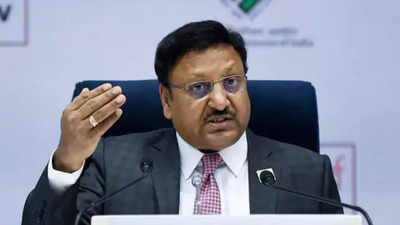NEW DELHI: Airing concerns on social media and digital platforms becoming tools for misinformation and manipulation of voters through fake narratives and lack of algorithmic checks against one-sided content and detectable fakes, chief election commissioner Rajiv Kumar said the “polluted social media” needed a “graded response action plan” wherein “algorithms clarify and inform rather than distort and misinform”.
In his valedictory remarks at the two-day international conference on ‘Global Election Year 2024: Reiteration of Democratic Spaces’, organised here by EC, Kumar said while social media and digital platforms have democratised access to information and provide a platform for free expression, the very core of democracy, they have also become tools for destroying that very core. He pointed to challenges of internal and external actors trying to influence the poll outcome through unchecked use of bots and spread of misinformation and disinformation through fake social media content and AI-generated ‘deep fakes’ created to distort public opinion and polarise societies.
While sharing that EC had recently issued an advisory to parties to clearly label AI-generated content circulated on social media, the CEC on Friday drew attention of election management bodies (EMBs) of the world to social media algorithms that are designed to repeatedly present content aligned with one existing view, without exposing the person to the other side of the argument.
Calling upon big tech entities to introspect “before it is too late” and not be guided by business interests alone, Kumar sought algorithms that clarify and inform and also prevent detectable fakes. He cited the example of lookalike EVMs in old videos that surface on social media during polls to discredit the authentic EVMs. “When exact dimensions and means to distinguish every fake, lookalike EVM are available, why would the algorithm not identify such content in the first place and block it?” he asked. Kumar emphasised that leaving it to fact-checkers to counter misinformation takes up substantial time and energy and there is huge risk associated with real-time spread of one-sided fake content at vital stages of the electoral cycle.
Kumar also used the occasion to question ratings like ‘democracy index’ “based on a few media reports and social media conversations”. “The parameters need to be rational and transparent,” he said, adding that ratings based on select media reports “become tools for discrediting elections”. The CEC suggested ‘democracy index’ be replaced with ‘election integrity index’, either in addition to ‘democracy index’ or as a separate index within “democracy index with pre-defined weightage”. He called upon EMBs to collectively work on the revised index “in the interest of voters, elections and democracy”.
Pointing to emerging challenges like post-poll disputes and ‘motivated’ narratives that seek to discredit a concluded election, the CEC on Friday stressed upon the need to address these in a timely, transparent and fair manner, while advocating strong judicial oversight to sustain voter confidence in the electoral process.
Conceding a rise in cyberattacks targeting electoral systems in the future, Kumar stressed on the need to tackle them with robust defence mechanisms like encryption, intrusion detection systems, and advanced firewalls.




